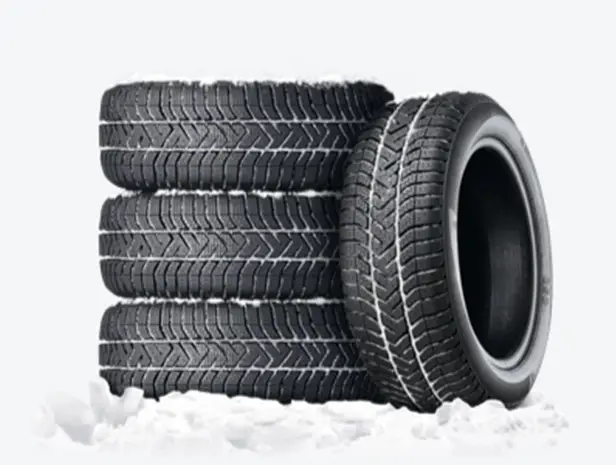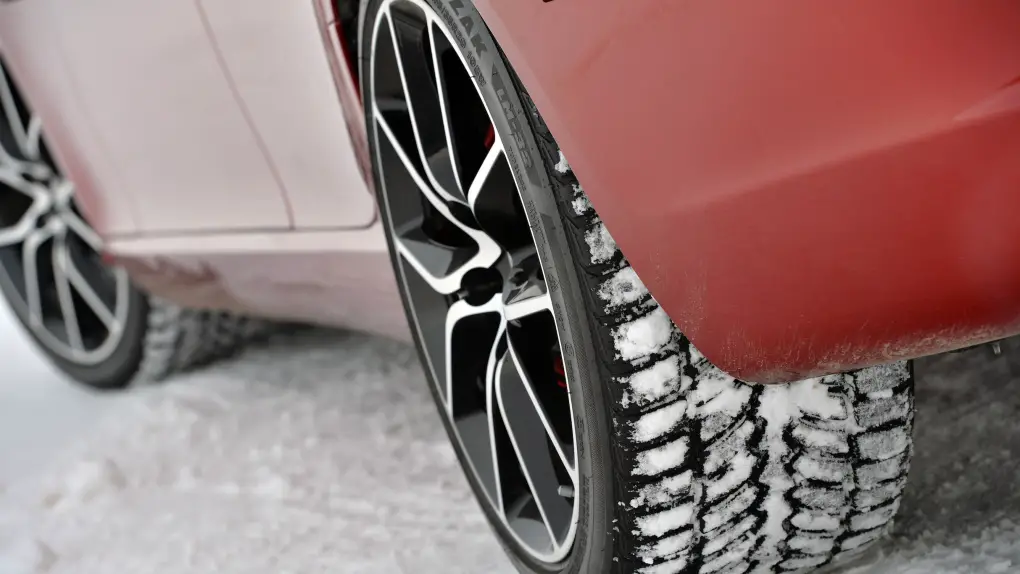How long do winter tires last? As the colder months draw near and icy roads become a common occurrence, drivers naturally start considering the durability and lifespan of their winter tires. Winter tires play a critical role in ensuring safe driving in cold weather conditions, as they are specifically designed to deliver enhanced traction and handling on snow and ice-covered roads.
In this comprehensive guide, we aim to explore the factors that influence the lifespan of winter tires, equipping you with valuable insights to make informed decisions regarding their maintenance and replacement.

Winter tires are not just an optional accessory; they are a necessity for those living in regions where winter conditions bring challenging driving environments. While all-season tires may struggle to maintain grip and handling in frigid temperatures, winter tires are engineered with unique features that allow them to remain flexible and provide optimal performance even in freezing conditions.
How Long Do Winter Tires Last?
The lifespan of winter tires can vary based on several factors, including the quality of the tires, driving conditions, maintenance, and how frequently you use them. On average, winter tires can last anywhere from three to six winter seasons, which translates to roughly 15,000 to 30,000 miles of driving. However, some winter tires may wear out more quickly, while others might last longer.
Winter tires, also known as snow tires, are specifically designed to perform optimally in cold weather conditions. They feature unique tread patterns, deeper grooves, and specialized rubber compounds that remain flexible even in low temperatures. These design elements work together to enhance grip, braking, and overall vehicle control on snowy and icy surfaces.
Average Lifespan of Winter Tires
On average, winter tires can last for about 3 to 6 winter seasons. However, several factors can influence their lifespan. Mileage, driving conditions, and the quality of the tires all play a role. Regular inspections and monitoring of tread wear are essential to determine when it is time to replace winter tires.
Factors Affecting Winter Tire Lifespan

The lifespan of winter tires can be influenced by several factors. Understanding these factors can help you maximize the longevity and performance of your winter tires. Here are the key factors that can affect the lifespan of your winter tires:
- Tire Quality and Brand: The quality and reputation of the tire brand matter. High-quality winter tires with advanced tread compounds and designs tend to last longer and perform better in harsh conditions.
- Tread Depth: Winter tires have deeper tread patterns to enhance traction on snow and ice. As the tread wears down, their effectiveness in winter conditions diminishes. Check the tread depth regularly, and replace tires when they reach a certain tread depth threshold.
- Driving Conditions: Severe winter conditions, such as heavy snow, ice, and very low temperatures, can lead to increased tire wear. Frequent exposure to harsh conditions can wear down the tread more quickly.
- Temperature Fluctuations: Wide temperature fluctuations, such as sudden temperature changes from cold to warm, can impact tire performance and longevity. This is especially true for winter tires, which are designed for colder temperatures.
- Road Conditions: Abrasive road surfaces, like roads treated with salt or gravel, can cause increased tire wear. Rough roads and potholes can also take a toll on tire life.
- Driving Habits: Aggressive driving, sudden braking, sharp turns, and high-speed driving can accelerate tire wear. Gentle driving habits can help extend the life of your tires.
- Proper Inflation: Underinflated or overinflated tires wear unevenly and can lead to premature wear. Check your tire pressure regularly and maintain it according to the manufacturer’s recommendations.
- Wheel Alignment: Incorrect wheel alignment can cause uneven tire wear. Regular alignment checks and adjustments can help ensure even wear across all tires.
- Rotation: Regularly rotating your tires (including winter tires) helps distribute wear more evenly among all tires. Follow the manufacturer’s recommendations for rotation intervals.
- Storage: Proper tire storage during the offseason is important. Keep tires in a cool, dry, and dark environment to prevent deterioration. Avoid exposure to direct sunlight, extreme temperatures, and chemicals.
- Tire Type: Different winter tire models are designed for varying levels of snow and ice traction. Some tires are optimized for more extreme winter conditions and may wear faster on dry roads.
- Mileage: The more you drive, the faster your tires will wear. Keep track of your mileage and factor it into your tire maintenance schedule.
Why Are Winter Tires Necessary?

According to a survey conducted by the Tire and Rubber Association of Canada, the utilization of winter tires varies across different provinces in Canada. The survey revealed that in Quebec, where winter tires have been mandatory since 2008, the utilization rate is at 100 percent. This means that all drivers in Quebec are required to equip their vehicles with winter tires during the designated winter season.
However, in provinces such as Manitoba and Saskatchewan, the utilization rate is lower, at around 60 percent. This indicates that a significant portion of drivers in these provinces are not using winter tires despite the potential benefits they offer in cold weather conditions.
They are essential for several other reasons including:
- Improved Traction: Winter tires are made from special rubber compounds that remain flexible at low temperatures. This flexibility allows them to grip the road better in icy and snowy conditions, providing better traction when accelerating, braking, and cornering.
- Enhanced Braking: Winter tires have tread patterns with deep grooves and sipes (tiny slits) that help channel water, slush, and snow away from the tire’s surface. This prevents hydroplaning and improves braking performance on wet and icy surfaces.
- Better Handling: The unique tread designs of winter tires are optimized for cold conditions. They provide more responsive handling in winter weather, reducing the risk of skidding or loss of control.
- Confidence in Snow and Ice: Winter tires greatly improve your vehicle’s ability to navigate through snow-covered and icy roads. They help prevent sliding and fishtailing, offering a safer driving experience in challenging conditions.
- Shorter Stopping Distances: Winter tires can significantly reduce your vehicle’s stopping distances on snow and ice compared to all-season or summer tires. This can be a critical factor in avoiding accidents.
- Cold Temperature Performance: Winter tires maintain their performance even in extremely cold temperatures. Regular tires can become hard and lose traction in icy conditions, whereas winter tires remain pliable and effective.
- Minimized Risk of Accidents: By providing better grip and control, winter tires reduce the likelihood of accidents caused by loss of control, skidding, and other winter-related driving challenges.
- Legal Requirements: In some regions with harsh winter conditions, using winter tires during the colder months might be a legal requirement. This is often due to the improved safety they offer on snowy and icy roads.
- Insurance Benefits: In some cases, using winter tires during the winter months may result in lower insurance premiums or discounts, as they are recognized for contributing to safer driving.
It’s important to note that while winter tires offer substantial benefits during cold weather, they are not intended for year-round use. They have a different rubber composition and tread pattern that can wear quickly on warm, dry roads. It’s recommended to switch back to all-season or summer tires when the winter season is over.
How To Extend The Lifespan Of Winter Tires
With these tips, you can help ensure that your winter tires last as long as possible:
- Regular Maintenance and Inspection:
- Check Tire Pressure: Keep your winter tires properly inflated according to the manufacturer’s recommended pressure. Cold temperatures can cause tire pressure to drop, so check it regularly.
- Visual Inspection: Regularly inspect your tires for signs of damage, uneven wear, or punctures. Address any issues promptly.
- Proper Installation and Storage:
- Balance and Alignment: Ensure your winter tires are properly balanced and aligned. Incorrect alignment can lead to uneven tire wear.
- Professional Installation: Have your winter tires installed by a professional to ensure they are mounted correctly and balanced.
- Rotate Your Tires:
- Regular Rotation: Rotate your winter tires according to the manufacturer’s recommendations. This helps ensure even wear and extends their overall lifespan.
- Avoid Aggressive Driving:
- Gentle Acceleration and Braking: Aggressive driving behaviors, such as rapid acceleration and hard braking, can cause excessive wear on your tires. Practice smooth driving to reduce stress on the tires.
- Avoid Overloading the Vehicle:
- Check Load Capacity: Make sure your vehicle is not overloaded beyond its recommended capacity. Excess weight can lead to increased tire wear.
- Minimize High-Speed Driving:
- Reduced High-Speed Driving: High speeds generate more heat, which can wear down tire tread more quickly. Limit high-speed driving, especially on winter tires designed for cold conditions.
- Proper Storage During Off-Season:
- Store Tires Correctly: If you’re not using your winter tires during the offseason, store them in a cool, dry, and dark place. Avoid exposure to direct sunlight, extreme temperatures, and chemicals.
- Switch to All-Season or Summer Tires in Warmer Months:
- Timely Switching: Swap your winter tires for all-season or summer tires once winter conditions have passed. Winter tires are designed for cold temperatures and can wear out more quickly in warm weather.
- Avoid Harsh Road Conditions:
- Choose Roads Wisely: If possible, avoid driving on extremely rough or abrasive roads, as they can accelerate tire wear.
- Regular Cleaning:
- Clean Your Tires: Regularly clean your winter tires to remove road salt, dirt, and debris. Salt and chemicals used on roads can be corrosive and contribute to tire deterioration.
- Keep Speed in Check:
- Follow Speed Limits: Adhering to speed limits not only enhances safety but also helps reduce tire wear due to excessive heat generation.
- Plan for Smooth Routes:
- Avoid Potholes and Obstacles: If you’re aware of potholes or road debris ahead, try to navigate around them to minimize the risk of tire damage.
The Importance of Regular Inspections
Regular inspections play a crucial role in maintaining the safety, performance, and longevity of various aspects of your vehicle. Here are the key reasons why regular inspections are important:
- Safety: Inspections help identify potential safety hazards and issues that could compromise your safety and the safety of others on the road. Catching and addressing problems early can prevent accidents and breakdowns.
- Preventive Maintenance: Regular inspections allow you to catch minor issues before they turn into major problems. Addressing small concerns early on can prevent costly repairs down the line.
- Extended Lifespan: By identifying and addressing wear and tear promptly, you can extend the lifespan of your vehicle’s components, including the engine, brakes, tires, and more.
- Optimal Performance: Regular inspections ensure that your vehicle operates at its best. Properly maintained vehicles offer better fuel efficiency, smoother handling, and improved overall performance.
- Financial Savings: Early detection and repair of problems can save you money in the long run. Addressing small issues before they escalate can prevent the need for expensive repairs or replacements.
- Resale Value: Well-maintained vehicles with a documented history of regular inspections and maintenance tend to have higher resale values.
- Warranty Compliance: Some warranties require regular maintenance and inspections to remain valid. Following these guidelines can prevent warranty-related issues.
- Legal Compliance: In some areas, regular inspections are required by law to ensure that vehicles are roadworthy and meet safety standards.
- Environmental Impact: Regular inspections can help identify issues that contribute to excess emissions, allowing you to address them and reduce your vehicle’s environmental impact.
- Peace of Mind: Knowing that your vehicle is in good condition and that potential problems are being addressed can give you peace of mind while driving.
- Timely Repairs: Inspections help you identify problems before they cause a breakdown, preventing inconvenience and stress on the road.
- Component Interactions: Some issues in one area of your vehicle can impact other components. Regular inspections can identify such interactions and ensure that all parts work harmoniously.
- Educational Opportunity: When you receive inspection reports, you can learn more about your vehicle’s condition and gain insights into maintenance practices that can keep it running smoothly.
Related Search: Are Winter Tires Worth the Money?
Taking care of your winter tires not only enhances their lifespan but also prioritizes your safety on icy and snowy roads. By investing the time and effort into maintaining and monitoring your winter tires, you can confidently navigate through challenging winter driving conditions, knowing that you have prioritized safety and made the most of your investment.
Remember to consult with tire professionals and refer to manufacturer recommendations for specific guidance on caring for and replacing your winter tires.
With proper maintenance and attention, your winter tires will serve you well, providing the traction and reliability you need during the winter months. Drive safely and confidently, knowing that you are prepared for the challenges of winter driving.
People Also Ask
How long do winter tires typically last?
Winter tires generally have a lifespan of about 3 to 5 winter seasons. However, this can vary depending on factors such as usage, driving conditions, tire quality, and maintenance.
How can I determine when it’s time to replace my winter tires?
Monitoring the tread depth is crucial for determining when to replace winter tires. Most experts recommend replacing them when the tread depth reaches approximately 6/32 of an inch (4.8 mm). Tread wear indicators or tread wear bars on the tires can help identify when the tread has worn down to this point.
Can I use winter tires year-round to extend their lifespan?
While it may seem tempting to use winter tires throughout the year to get the most out of them, it is not recommended. Winter tires are designed specifically for cold weather conditions and may wear out quickly on warm and dry roads. It’s best to switch to all-season or summer tires once the winter season is over.
How can I extend the lifespan of my winter tires?
Proper maintenance is crucial for extending the lifespan of winter tires. Regular tire rotations help ensure even wear while maintaining the recommended tire pressure helps optimize performance and longevity. Storing winter tires in a cool, dry place during the off-season and following correct storage practices can also contribute to their lifespan.
Do winter tires wear out faster than all-season tires?
Winter tires tend to wear out faster than all-season tires due to their softer rubber compounds and specialized tread patterns. However, it’s important to remember that the primary purpose of winter tires is to provide enhanced traction and safety in cold weather conditions, making their shorter lifespan worth the investment for winter driving.
Can I mix different brands or models of winter tires on my vehicle?
While it is generally recommended to use a matching set of winter tires on all four wheels of your vehicle for optimal performance, it is possible to mix different brands or models of winter tires. However, it’s crucial to consult with a tire professional to ensure compatibility and understand any potential effects on performance and handling.




